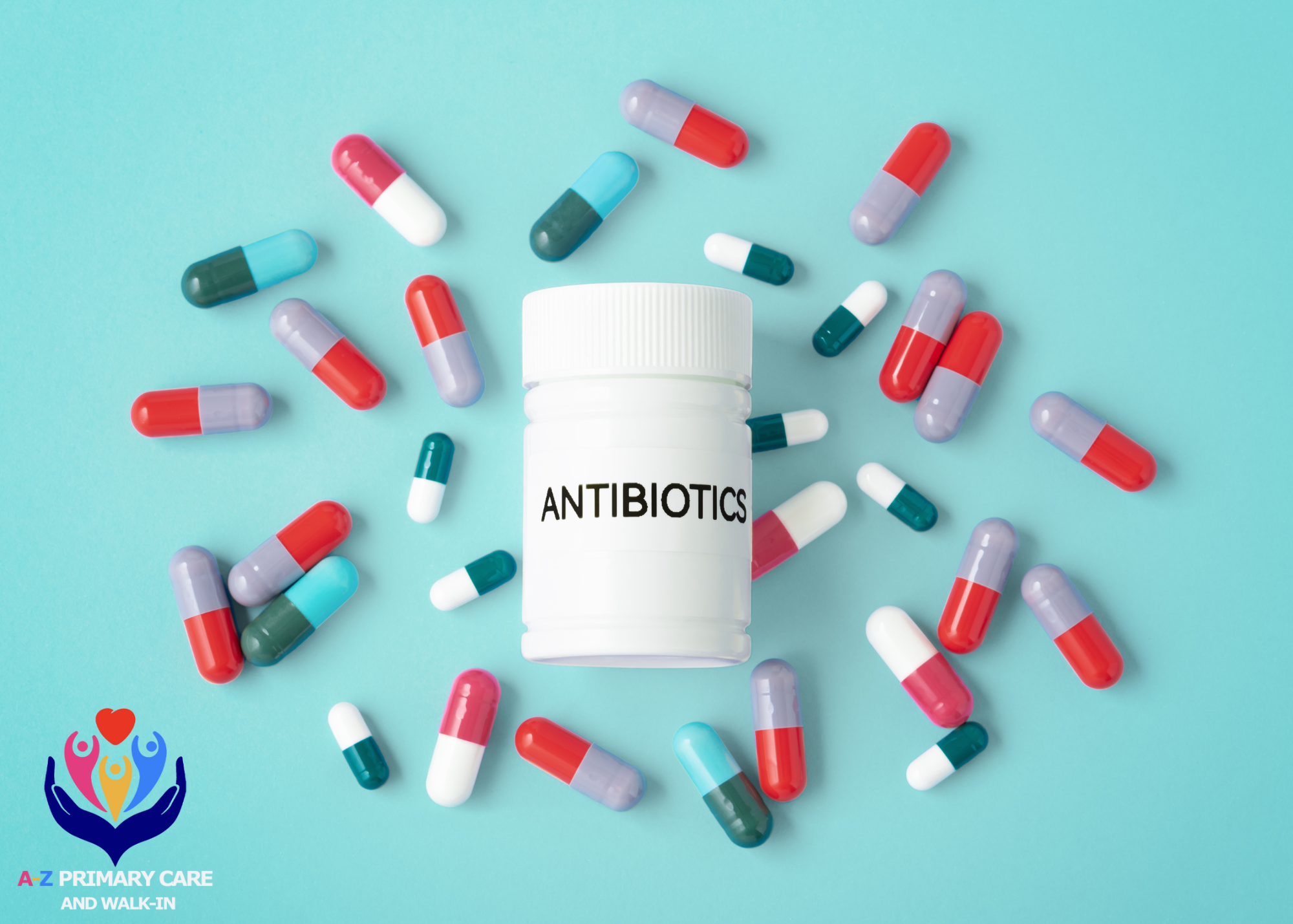Antibiotics have transformed modern medicine, saving millions of lives by effectively treating bacterial infections. However, misuse and overuse have led to a looming global health crisis—antibiotic resistance. Understanding how antibiotics work, why misuse is harmful, and what we can do to combat resistance is critical for preserving the effectiveness of these life-saving drugs.
For expert medical advice or a consultation, visit A-Z Primary Care or call 281-801-4286 today.
What Are Antibiotics and How Do They Work?
Antibiotics are powerful medications designed to kill or inhibit the growth of bacteria. They are essential in treating bacterial infections like strep throat, pneumonia, and urinary tract infections (UTIs). However, they are ineffective against viruses, such as those causing the common cold or flu.
Antibiotics work in various ways:
- Killing Bacteria: Some antibiotics directly destroy bacterial cell walls or membranes.
- Preventing Growth: Others halt processes like protein synthesis, which bacteria need to survive and multiply.
According to the CDC, using antibiotics appropriately—only when prescribed and needed—is vital to avoid unintended health risks and resistance.
The Misuse of Antibiotics
Overprescription and Incorrect Use
Many people mistakenly believe antibiotics are a cure-all for any infection. Unfortunately, this misunderstanding leads to overprescription and inappropriate usage. Common examples of misuse include:
- Taking antibiotics for viral infections.
- Skipping doses or not completing the prescribed course.
- Using leftover antibiotics without medical advice.
One shocking insight from StatPearls reports that in 2015, 30% of outpatient antibiotic prescriptions were unnecessary. Respiratory infections, mostly caused by viruses, accounted for over half of these prescriptions.
Health Consequences of Misuse
Misusing antibiotics increases the risk of:
- Side effects like nausea, diarrhea, or allergic reactions.
- Longer recovery times due to improper treatment.
- Secondary infections from disrupting the body’s natural bacteria balance.
Health professionals emphasize the importance of targeted therapy—using the correct antibiotic for the right bacterial infection and following the prescribed duration.
What Is Antibiotic Resistance?
The World Health Organization defines antibiotic resistance (AMR) as the ability of bacteria to withstand the drugs intended to kill them. Here’s how resistance develops:
- Overuse and Exposure: Excessive antibiotic use accelerates bacterial evolution.
- Genetic Adaptations: Some bacteria develop genetic mutations that render antibiotics less effective or completely useless.
- Spread of Resistance: Resistant strains can transfer their genes to other bacteria, amplifying the problem.
Antibiotic resistance is a global public health crisis, with drug-resistant bacteria causing over 1.27 million deaths annually worldwide, according to the WHO. The issue extends beyond healthcare facilities into agriculture and food production, where antibiotics are often overused.
Why Should You Care About Resistance?
Antibiotic resistance endangers:
- Medical Procedures: Surgery, cancer treatments, and transplants rely on effective antibiotics for preventing infections.
- Health Systems: Resistant infections lead to longer hospital stays and complex treatments, increasing healthcare costs.
- Public Safety: Everyday infections like UTIs or pneumonia could become untreatable, as explained by Thermo Fisher.
How to Use Antibiotics Responsibly and Prevent Resistance
Everyone has a role in combating antibiotic resistance. Here are actionable steps you can take:
Do’s:
- Follow Prescriptions Closely:
- Take the exact dose at the prescribed intervals.
- Complete the entire course, even if you feel better.
- Trust Your Doctor’s Advice:
- Consult with healthcare providers before starting or stopping antibiotics.
- Understand when antibiotics are unnecessary, especially for viral infections.
- Maintain Preventative Health:
- Get recommended vaccinations to reduce the risk of infections.
- Practice good hygiene, like regular handwashing, to prevent the spread of bacteria.
Don’ts:
- Don’t Self-Prescribe:
- Avoid using leftover antibiotics from a previous illness.
- Don’t Share Medications:
- Medications prescribed for one person may not work for another.
- Don’t Pressure Your Doctor:
- Refrain from insisting on antibiotics when they aren’t warranted.
What Can Healthcare Systems Do?
Healthcare providers and policymakers must adopt comprehensive stewardship programs. These initiatives, highlighted by PMC, aim to ensure antibiotics are prescribed judiciously and only when needed. Technological advancements like rapid diagnostic tests can help identify bacterial infections faster, aiding in more precise treatments.
The Call to Action
Combating antibiotic resistance starts with informed, responsible use. By working together—patients, healthcare providers, and policymakers alike—we can preserve the effectiveness of antibiotics for future generations.
If you have questions about antibiotics or need personalized healthcare guidance, schedule a consultation with A-Z Primary Care. Call 281-801-4286 today to take the next step toward smarter, safer antibiotic use.
Antibiotics save lives, but their power must be protected. Make informed choices—because the health of tomorrow depends on the actions we take today.

